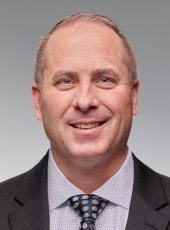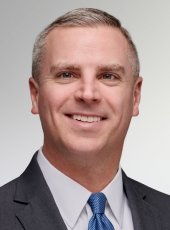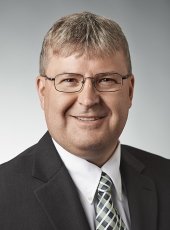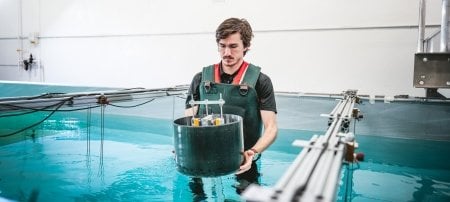Consumers Energy—Michigan's second-largest public utility—has established itself as a state- and nationwide leader in the transition to sustainable, cleaner, more reliable energy. Five Michigan Tech grads are helping lead the company's charge.
In the face of finite energy sources, unpredictable weather patterns, and the rising costs associated with both, most utility companies recognize the need for long-term energy plans based on sources that are reliable, renewable, sustainable, and affordable. In 2021, Jackson-based Consumers Energy issued a 20-year clean energy plan that placed the company on track to go coal-free by 2025 and achieve net-zero carbon emissions by 2040. Only a handful of utilities in the nation have made similar commitments regarding carbon emissions—and of those, most are aiming for 2050.
"We used to operate 12 coal plants," says Garrick Rochow '96, the company's president and CEO. "Now only three are left, and they'll retire in two years. That's a 60 percent carbon reduction, which puts us in line with the Paris Accord 1.5-degree scenario."
The Paris Accord, more formally called the Paris Agreement, is a legally binding international treaty among 195 countries to substantially reduce global greenhouse gas emissions. The goal of the agreement is to hold the global temperature increase below 2 degrees Celsius—above pre-industrial levels—and try to limit the increase to 1.5 degrees.
"There's no other utility in the US that's talking about the 1.5-degree scenario," says Rochow.
Alongside Rochow and others leading Consumers Energy in this bold vision for the future are LeeRoy Wells Jr. '02, senior vice president of operations; Norm Kapala '96, vice president of generation operations; Chris Fultz '01 '07, vice president of gas operations; and Tim Sparks '90, vice president of electric supply.
Leading the Transformation
In October 2023, the US Department of Energy (DOE) awarded $100 million to Consumers Energy to strengthen the state's electric distribution system, particularly for disadvantaged communities most impacted by power outages. Roughly $1 billion was available through the DOE's Grid Resilience Utility and Industry Grants program, and of the approximately 300 project proposals, Consumers Energy's was one of only seven to receive funding—cementing Consumers Energy as a national leader in the clean energy transformation.
A Sustainable Energy Future
Learn how Consumers Energy is building a sustainable energy future for Michigan.
Transformations like this mean utility companies must adapt and evolve to survive. For Consumers Energy, this means focusing not just on cleaner sources, but on balancing the needs of reliability, affordability, and sustainability.
This includes, Rochow notes, a large-scale change in how energy is supplied—a shift from traditional fuels to renewable resources. It also involves changes to infrastructure—for instance, electric grids designed in the 1940s for 40-mile-per-hour winds now need to be designed for 80-mile-per-hour winds. It includes incorporating technology like machine learning and artificial intelligence (AI) to better predict events that impact customer service, like power outages.
"Consumers Energy actually started its own transition in 2016, and we'll end our use of coal in 2025," says Sparks, who recently retired after nearly 35 years of dedicated service to Consumers Energy. "Nine years is pretty quick in an industry where you have assets worth hundreds of millions of dollars and it takes a while to shift direction and do it responsibly. You can't just shut down all the controllable generation and go to intermittent sources. We're looking at supply reliability and how we can get more controllable energy in the future, but still meet the clean goals that we have."
Fultz says while Consumers Energy is exiting coal faster than just about any utility in the country—and delivering 8 gigawatts of solar power and other forms of renewable energy in its place—the utility is also making changes to its natural gas program. "We have partnerships with dairy farms to leverage anaerobic digestion to take byproducts that come from farming and turn that into clean, usable natural gas," he says.
"Our role is to show the country how to make this transformation to clean energy. We can do it for the betterment of all our stakeholders. We're going to implement the right systems and make the best decisions at the time for what's best for our coworkers, our communities, our planet, and our state."
Wells is both proud and excited that Consumers Energy is a national leader in clean energy planning. "For us, it's more than a transition—it's a transformation of how we produce energy and our commitment to the environment."
Future-proof: The Power of a Michigan Tech Education
When asked how their Michigan Tech education prepared them to lead, the five executives give similar answers.
"My education at Michigan Tech provided me with the tools for critical thinking and complex problem-solving," says Wells. "It showed me how to work with others to solve difficult problems, and the importance of having and working with a team. Having that grit and determination, and knowing how to lean on your teammates to get you through it, applies both in education as well as in the workplace."
Fultz gained some of the most important knowledge he took from Michigan Tech in unexpected courses. "In my current role, I need to be able to understand engineering and I need to be able to learn and apply technical concepts," he says, "but the economics, the leadership, and the written and verbal communication skills I learned at Tech are much more important now than I ever dreamed they'd be at the time I was taking those courses. The first half of my career was built on the technical part of my education; the second half of my career has been built on everything I learned outside of engineering."
"I gained a very good basis in the fundamentals of engineering and how to think critically," says Sparks. "The fundamentals really gave me a jump-start compared to coworkers from other universities who were hired at the same time. I could tell they had a little bit of catching up to do."
Rochow remembers a particular mentor whose example has stayed with him: "Dr. David Hand," he says, recalling the former chair of the Department of Civil, Environmental, and Geospatial Engineering—now a professor emeritus. "I loved how much energy and passion he brought to what he was teaching. His energy and positivity are something I carry with me even today. You can choose how you want to be in life. You can choose how you want to run a business. You can choose how you want to show up every day at work, and what kind of energy you're bringing to the conversation, because that can lift spirits."
Michigan Tech's Role in the New Energy Future
Goals like net-zero carbon emissions by 2040 are ambitious and will require innovation and new technology. Looking toward the new energy future, Consumers Energy executives see major opportunities for Michigan Tech in research and development (R&D).

"Simply put, renewables are great, but they're still intermittent in nature," says Rochow. "There are periods of time when there is no energy production if the sun doesn't shine or the wind doesn't blow. Advancing battery technology and other storage technologies is really important to this transformation. Fossil fuels and natural gas are an important bridge, which means carbon capture technology is essential. There's some research into nuclear energy and small modular reactors, but it's not scalable yet. R&D can look at scalability and predictability, and bring new technologies to bear, which MTU is well-suited for from an industry perspective."
Rochow also notes that if utilities are not embracing AI now, they will probably be obsolete in 10 years. Michigan Tech can turn out graduates, he says, who can move into the AI and machine learning space to create solutions that better predict how utilities do their work—for example, machine learning that predicts where power outages will occur, affecting customer outcomes.
Kapala likewise sees great opportunity for Michigan Tech in research and development. "But just as importantly, Michigan Tech can put that spark in students," he says. "The energy and utility sector is an exciting field to go into. Carbon sequestration, hydrogen, storage—a utility is an important place to be. Michigan Tech can create the spark in students to want to work in the utility industry, help us recruit and retain talent for Michigan, and help us find the next best resource to deliver energy to all of Michigan."
"Being a national leader, it's not only about finding a solution, but finding the best solution for all," says Wells. "I think it's critical that all voices are heard in this transformation. As we continue to grow the population at Michigan Tech, it's just as crucial to grow the enrollment of women and individuals from diverse backgrounds."
All five leaders agree that their alma mater seems more agile and adaptable than other universities, positioning Tech to be a catalyst for Michigan's future. "There's also something special about Michigan Tech alumni who are in the workforce and want to see Tech succeed," says Fultz. "The alumni bring a particular passion, and they're uniquely placed in industry to help drive University-industry partnerships. Whatever the future looks like, the University and its industry partners will see that it's direct, it's applicable, and it's effective."
Q&A
Why did you choose Tech?
"First, it had a great reputation as an engineering school. Second, it was the right size. I didn't see myself at a 40,000-student school. I wasn't just a number at Michigan Tech. And third, value. Value was important even back in 1992. Finances matter, and I knew I would get a great education for a reasonable investment." —Garrick Rochow, president and CEO, Consumers Energy
"I knew in middle school that I really liked solving problems and had a love and passion for math and science, and as I started to look into schools, Michigan Tech was at the top of my list. I had a cousin, Aaron Alan, who attended Michigan Tech and also played football there a few years before I did. I knew Michigan Tech was a great opportunity to become an engineer who could go out into the world and solve problems, and it was also a great opportunity to continue to play a sport I loved. That combination was the perfect fit for me." —LeeRoy Wells, senior vice president of operations, Consumers Energy
"That's easy—the best engineers in the world graduate from Michigan Tech, and that's what I aspired to be. I wanted to be the best. Also, the people. The majority of people and students that I met when I was a student didn't go to Tech because it's convenient. You go to Tech because you want to be there, you want to learn, and there's a lot of folks you can relate with. You grow a stronger bond because you're there all the time. It's more than academic reputation."

"I fell in love with physics in high school, and then I took electricity and I was like, 'Okay, this is what I want to do.' I went to college knowing what I was going to do. I knew I wanted to go into engineering—I knew you went to Tech to be the best engineer." —Chris Fultz, vice president of gas operations, Consumers Energy
How did your Michigan Tech education prepare you for your career and current role?
"When you talk about a Michigan Tech education, it has to start with a strong foundational education—rigorous academics coupled with practical application. I would couple that also with team projects and relationship building. Michigan Tech is unique in that the college experience never really ends unless you're on an extended holiday break. You go up to MTU and you stay there, so you're always working on different projects, whether it's directly related to a specific course or it's a project you're doing because you're out having fun. A Michigan Tech education is more than going to class. It's the overall experience, and a big part of that is the team building and relationship building that happened over the course of my time there." —Norm Kapala, vice president of generation operations, Consumers Energy
"One of the things that Michigan Tech provides, regardless of the role that you're in, is a strong foundation in the fundamentals—thermodynamics, statics, chemistry, fluids, the principles of electric—all of which are key to running an infrastructure company. When you have the fundamentals to rest on, you can ask good questions to make sure the project is going to be successful. Michigan Tech also does a wonderful job of encouraging engineers and graduates to think from a critical standpoint—to explore and to understand and to be curious. When you're doing large projects or sharing information with investors or looking at the financials, it's important to be curious and inquisitive, and think multiple steps ahead about how things will play out."

"The alumni feeling is so strong because you feel like you earned something that others don't by doing something that was created by and focused on getting the best students and providing them the best, most challenging engineering courses. Michigan Tech was hard to get to, it was hard to get through winter, and when you come out the other end and you survived in the trenches, you have that extra bit of pride in graduating from Michigan Tech." —Chris Fultz, vice president of gas operations, Consumers Energy
What person, internship, or opportunity from your time at MTU has been critical to your success?
"The names that come to mind are Doc Wiitanen, John Lukowski, Ashok Ambardar, and Nader Namazi. I remember Lukowski taught Engineering Fundamentals. He came in wearing a flannel shirt, and I was like, 'This is my guy.' But all of them would spend the time with you if you had questions. They wanted to help the students that wanted the help." —Tim Sparks, retired vice president of electric supply, Consumers Energy
"My internship as a maintenance supervisor with General Motors allowed me to use the things I had learned from a technical perspective. Not only did I utilize those critical-thinking and problem-solving skills, I also had 40 people reporting to me. As a young engineer, having people reporting to me who were probably twice my age was very helpful in my development. Those experiences prepared me to go into a crew room and have hard conversations and be aware of the struggles my team might be facing."

"Doc Wiitanen's passion in the classroom was infectious. It was hard not to catch his passion for electrical engineering. I focused on power engineering in graduate school, and Bruce Mork and Leonard Bohmann, who was my advisor, did a great job of teaching it in ways they knew I would be applying it as an electrical engineer." —Chris Fultz, vice president of gas operations, Consumers Energy
What moment in your career has been pivotal in getting you to where you are today?
"I began my career in environmental engineering, and I came to a point where I wanted to move up within the company. I had to decide to go do something different to take on a new level of leadership, but it required me to move away from environmental engineering. I had to rely on the fundamentals of engineering to take on a different role, and I became a maintenance superintendent at a power plant. I learned a lot about union relations and people relations as I stepped into a leadership role and it was my first time doing so. It was uncomfortable for me, but I used the fundamentals to learn something new and grow, and take that step as a leader." —Garrick Rochow, president and CEO, Consumers Energy
"There was a moment when I changed my thinking from 'How does the next move build on my last move?' to 'What do I know about that?' That's when everything opened up and changed. I started moving into areas where I felt uncomfortable rather than staying where I felt comfortable. I decided to lean into the discomfort and see where it led me next."

"I spent the first five years of my career working in power generation and supply. I then had the opportunity to come over to the distribution side, and in my managerial role, I didn't have those daily contacts with my coworkers and my team. I quickly learned the difference between managing and leadership. As a leader, you have to connect with not only the head but also the heart of individuals to make sure they understand the vision, the strategy, and the plan. That way they can execute even when you're not there." —LeeRoy Wells, senior vice president of operations, Consumers Energy
What role do you see Consumers Energy playing in solidifying Michigan's place as a national leader in clean energy?
"I think we're the tip of the spear. We are exiting coal faster than just about any utility in the country, and we're delivering 8 gigawatts of solar, which is about 52 square miles in our clean energy plan. Those are highly ambitious breakthrough goals, but we're committed to them. We're also doing things differently in our gas system. We have partnerships with dairy farms to leverage anaerobic digestion to take their byproducts from running dairy farms and turn that into clean, usable natural gas." —Chris Fultz, vice president of gas operations, Consumers Energy
"Consumers was the first major utility to put forth a public integrated resource plan back in 2018. We have continued to lead in that space as integrated resource plans evolve in Michigan and requirements change. We're right there on the cutting edge, way farther ahead than most."

"We are leading the clean energy transformation from traditional fossil fuels like coal to renewable resources. We're not a follower. We're not even a fast follower. You have to be leading within this space because the world is changing so quickly. Our customers expect something different, policymakers expect something different, and our strategic plan makes us different." —Garrick Rochow, president and CEO, Consumers Energy
What role do you see Michigan Tech playing in solidifying Michigan's place as a national leader in clean energy?
"First, research and development (R&D). With goals like net zero by 2040, there's a big need for technology, especially battery technology and other energy storage technologies. Michigan Tech can also turn out great graduates who are willing to step into the space of AI and machine learning. Investors are saying that if utilities are not embracing AI right now, they will probably be obsolete in 10 years. We need to be looking at how we can embrace AI and move to solutions that better predict how to do our work—for example, machine learning that predicts where outages will occur." —Garrick Rochow, president and CEO, Consumers Energy
"I see great opportunity in research and development. What is the new and best available technology for us to use, especially on the supply side? Doing the testing, doing the development, doing the research. Just as importantly, Michigan Tech can continue to put the spark in students to want to work in the utility industry. Carbon sequestration, hydrogen, storage—being part of a utility is an exciting place to be. So, Michigan Tech can help us recruit and retain talent in the state, and help us find the next best resource to deliver energy to all of Michigan." —Norm Kapala, vice president of generation operations, Consumers Energy
"I'm very bullish that Michigan Tech can be the catalyst for Michigan's future. Tech seems to be more agile than other universities. So if the University said, 'Let's stand up a renewables program and make it world-class,' the next year it's all of a sudden world-class. Same thing with AI. Michigan Tech is able to adapt more quickly than other schools, and because of that, it brings in the best people. That's why I've spent so much time recruiting there—because the quality of students is so high." —Chris Fultz, vice president of gas operations, Consumers Energy
Michigan Technological University is an R1 public research university founded in 1885 in Houghton, and is home to nearly 7,500 students from more than 60 countries around the world. Consistently ranked among the best universities in the country for return on investment, Michigan's flagship technological university offers more than 120 undergraduate and graduate degree programs in science and technology, engineering, computing, forestry, business, health professions, humanities, mathematics, social sciences, and the arts. The rural campus is situated just miles from Lake Superior in Michigan's Upper Peninsula, offering year-round opportunities for outdoor adventure.




